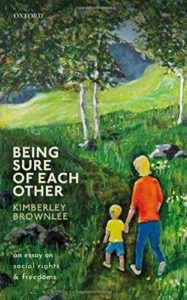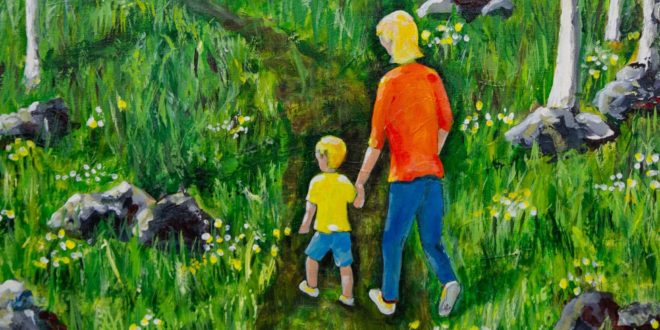Podcast: Play in new window | Download (Duration: 59:00 — 36.8MB)
 This is the first of two conversations I had with Kimberley Brownlee about her recent book Being Sure of Each Other: An Essay on Social Rights and Freedoms.
This is the first of two conversations I had with Kimberley Brownlee about her recent book Being Sure of Each Other: An Essay on Social Rights and Freedoms.
Brownlee writes that our social needs are so fundamental, basic, and universal, that they lead us necessarily into the territory of human rights. Meeting our social needs – for decent human contact, acceptance within a community, companionship, loving relations, and interdependent care – is more important than meeting almost every other need we have.
She writes further:
Human rights protect the brute moral minimum, i.e. the least that we owe each other as human beings. We must have, at the very least, a human right against social deprivation, or rather a right to have access to decent human contact, to try to form and keep good social connections, to be protected in our connections once they exist, to be put into supportive connections when we’re unable to make social overtures, and to have the social resources we need to sustain the people we care about.
Social rights might be called rights that constrain what we like to call freedom. Brownlee makes these claims primarily against freedom of association – which means, in the main, freedom to exclude – and what seems a common assumption that it’s not only permissible to ignore other humans but that it’s okay, even a larger social good, to put people in prisons and remove their social networks of care. And more than that, to deprive them of all human contact. This has been widely agreed to be torture. And yet, the United States makes it common practice.
But this social deprivation is not only a moral wrong but a deep violation of those human rights – and really just makes us sad and mean.
 GUEST
GUEST
Kimberley Brownlee is a Professor of Philosophy at the University of British Columbia. Her current research focuses on sociability, social rights, loneliness, and freedom of association. Her previous book, also published by Oxford, is Conscience and Conviction: The Case for Civil Disobedience.
RELATED
Social needs are a human right by Kimberley Brownlee
Maslow’s Hierarchy of Needs Explained
The self-reliant individual is a myth that needs updating by Kimberley Brownlee
MUSIC
The Police – “So Lonely”
Neil Young – “Out On the Weekend”
Terry Allen and the Panhandle Mystery Band – “Abandonitis”
Wilco – “How to Fight Loneliness”
Steve Earle and Rodney Crowell – “Stay a Little Longer”
(Recorded on December 24,1975 at the home of Guy and Susanna Clark; exerpt from the documentary “Heartworn Highways.”)
ID Break – “Lonely” by Makaya McCraven
CREDITS
Producer & Host: Doug Storm
Executive Producer: Kade Young
 WFHB Bloomington Community Radio
WFHB Bloomington Community Radio


